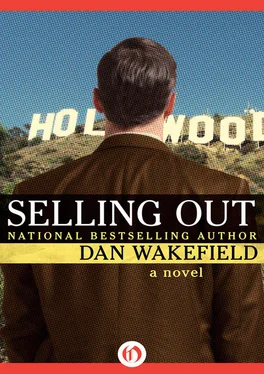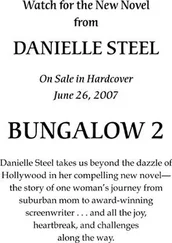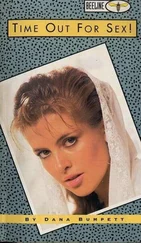His exhaustion now came at night. Where at home he was just getting into his stride around the cocktail hour, and hitting the sack around midnight or one o’clock, now after dinner he was bushed, done in, limp as a rag. In all ways. He couldn’t even think about sex, except on Saturday night. Even then, he had to, as it were, “get himself up for it,” and even during the act he found his mind straying to thoughts of “The First Year.”
Nor was it any wonder Perry was distracted from everything in life not relating to the show. His position as story consultant for the series gave him a great deal of responsibility. It also gave him a lot of influence.
For the first time in his life, he had influence over the lives of others—not just in giving a passing or a failing grade to a student, but in affecting the careers and incomes of other adult human beings. What made this even more awesome was that these people were similar to him in talent, ambition, and sensitivity—even in vulnerability. They were writers.
They flocked to special screenings set up for groups of them at the studio. The word went out all over town, through the trades and the grapevine and calls to agents, that a new show was in the works, an hour drama series rumored to be that rarest of all birds, a quality prime-time network series. Since the show had not yet been on the air, potential writers had to see the pilot in order to know what the series was about. They had to know who the characters were and what sort of situations they might be involved in before they could pitch an appropriate story line for consideration. To inform themselves of these matters they dutifully trooped to screenings of the pilot, armed with notebooks and pencils and hope.
Those who were not invited to attend, who did not have agents to submit their names and samples of their work for consideration, called and sent in work on their own. The inundation of writers grew in geographic scope as well as variety of applicants and ideas when one of the wire services carried a small item about Perry, the college teacher and short-story writer who had originated a new television show.
Aspiring writers not only sent in scripts they had written, but poems and verse plays, biographies and musicals, comedy sketches and magazine articles, inspirational essays from religious publications and feature stories on beloved pets that had been published in small-town weeklies. There were telephone calls from writers who claimed to be old buddies of Perry’s from college or the army or summers in the south of France or winters in the Alps or other such places where in fact he had never been in his life. There were those who swore they were best friends or sweethearts of people Perry had known in those or other places throughout his apparently teeming past, or friends of mysterious relatives who had allegedly assumed other identities.
Of the scores of inquiries and applications and supplications, the culmination came with the appearance of a wild-eyed man with a flaming red beard who gained entry to Perry’s office posing as a window washer and claiming to be a psychic messenger of the late seer Edgar Cayce, dispatched from the logging camp where he had worked for five years solely on the sacred mission of writing an episode of “The First Year’s the Hardest.”
Security guards and efficient secretaries accustomed to such entreaties disposed of most of the eager but uninvited applicants, but that still left nearly a hundred or so valid, working professional writers vying for what came down to three script assignments. Or two, if Perry chose to write the first episode of the series himself. As story consultant, it was his own choice. He was not used to all these choices.
Thankfully, the selection of the writers was not his alone; it was a decision made jointly with Kenton and Ned, and had to have Archer’s approval, as well as the network’s.
This eased a bit the gnawing sense of guilt Perry felt about sitting in judgment on other writers, and his uneasiness about the whole process of writers having to come and sell themselves.
In Perry’s own career as a writer he had never been required to “take meetings,” but simply to write his stories and put them in the mail. The first and only meeting he ever “took” was the one at the network with Archer, but he luckily did not at the time comprehend its import.
Had he known then he was supposed to be selling himself as well as his writing, he would, have freaked out and stayed home. No matter how tough it was to gather rejection slips, opening envelopes from your own mailbox in the privacy of your own home was far less agonizing than actually having to talk a good game at a meeting or pitch your story in a way that would sell it. Then, how degrading to read the indifference of disappointment on the faces of those with whom you were taking the meeting.
Yet Perry could see how it was necessary; he did not want to find himself working with some writer who he might feel was a schnook, or a bore, or had bad breath, no matter how brilliantly he put words on paper. Still, it was awful, and he bled for those candidates who obviously would not get the call alluded to in the obligatory phrase “We’ll get back to you.”
Perry quickly learned that writers with any success in the rugged field of television would not deign to do an hour of anyone else’s series, for the form known as episodic television was lowest in pay and prestige (and the two always went together out here) of all the network script possibilities. So the writers who came seeking assignments for the show were basically the young ones who were breaking in and the old ones who were hanging in.
Perry’s heart went out to the old guys, the veterans who in their forties and fifties were trying to make a living by knocking out some episodes for other people’s shows, a “Hart to Hart” or a “Dynasty” or maybe now a “First Year’s the Hardest,” while keeping the dream that one of their own original scripts would someday hit the jackpot.
This could be me , Perry realized with chilling recognition when he saw the older applicants pitching a story.
Perry knew from reading their work that some of them were men and women of true talent, with unproduced screenplays or theater pieces that seemed to Perry every bit as good as or better than most of what was making it big, but who simply had not had the right combination of elements to make it happen—the star or director or producer or packager who could get the right pieces all to fit at the right time. Still, they hung in; they toiled and smiled and came to these meetings with new ideas, pitched their wares with humor and intelligence and decency, and then, with thanks for the chance, went off, to wait hopefully to hear a yes to something, anything.
“There’s a term for it,” Perry explained to Jane after work one night, “when the writers have to come in and sell themselves. It’s called ‘tap dancing.’”
“Ugh,” she said, making a face. “It’s disgusting.”
She got up and started toward the house.
“Don’t blame me, I didn’t invent this system,” Perry said.
“I was just going to get a drink.”
“Oh. Would you bring me a glass of that good Chardonnay?”
Jane saluted in silence and went inside as Perry sank deeper into the hot tub. When he got down all the way to his chin and closed his eyes, letting the bubbling jets massage him, he almost didn’t mind the deprivation of being without his own swimming pool.
“Here you go,” Jane said, coming back out and handing Perry a long-stemmed glass filled with an almost golden-colored wine.
“You’re not joining me?” he asked.
“I still have to do it a little at a time,” she said, tentatively sticking a toe in the cauldron of water.
Читать дальше












